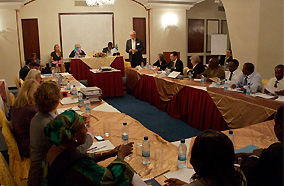Sweden’s Minister for Trade (Hon. Ewa Björling) and Tanzania’s Minister for Natural Resources and Tourism (Hon. Ezekiel M. Maige) organized a roundtable on 26 January 2012 in Dar es Salaam on how to prevent and combat illegal trade in endangered species, with support from the CITES Secretariat and the World Customs Organization (WCO).
Participants included representatives of: Tanzania’s Wildlife Division, National Parks Division, Wildlife Research Institute and Revenue Authority - Customs; Sweden’s Ministry of Foreign Affairs (which hosts the Minister for Trade) located in both Dar es Salaam and Stockholm; Nigeria’s Customs Services; the CITES Secretariat; WCO; the United Nations Office for Drugs and Crime (UNODC); the United Nations Environment Programme’s Great Apes Survival Partnership; TRAFFIC; World Wild Fund for Nature; Pan African Sanctuary Alliance; and African Apes.
During the ministerial segment of the roundtable, co-chaired by Ministers Björling and Maige, participants noted the need to raise the awareness of heads of State about the scale of illegal wildlife trafficking and its impacts not only on wildlife conservation but also the tourism sector and local livelihoods. They recognized that wildlife crime should be addressed from both the supply and demand sides, to be most effective. Acknowledging the electronic control systems that are already in place in many Customs services, participants concluded that other law enforcement agencies need to develop similar systems to support better communication and cooperation not only with Customs but also with each other.
A technical-level discussion, co-chaired by Ms. Marceil Yeater of the CITES Secretariat and Mr Mohamed Madehele of Tanzania’s Wildlife Division, followed the ministerial segment. During this session, participants noted that increased penalties for wildlife crimes need to be adopted to deter offenders and to obtain support from general law enforcement agencies. They expressed interest in using controlled deliveries as an investigation tool for wildlife crime, building on the experience gained with their use in drug crimes, and pointed out the importance of related awareness-raising activities. Participants recognized that enhanced cooperation among law enforcement agencies would bring different competencies together and strengthen the different pieces of the enforcement chain. They acknowledged that cooperation beyond law enforcement agencies (e.g. with other government agencies, local communities and non-State actors) was also necessary. Finally, they identified priority issues that needed immediate attention, such as the gathering and use of intelligence about recent instances of alleged illegal trade in great apes.
The findings and conclusions of the roundtable are expected to contribute to: targeted national wildlife law enforcement actions in producer and consumer countries; coordinated activities of the International Consortium on Combating Wildlife Crime (ICCWC), comprising the CITES Secretariat, INTERPOL, UNODC, the World Bank and WCO; upcoming international meetings on wildlife crime to be held in Bangkok, Thailand from 13 to 17 February 2012 and Lyon, France from 27 to 29 March 2012; and the second phase of an operational project in Africa and Asia (funded by Sweden) which will be organized by WCO later in the year.
See also:
